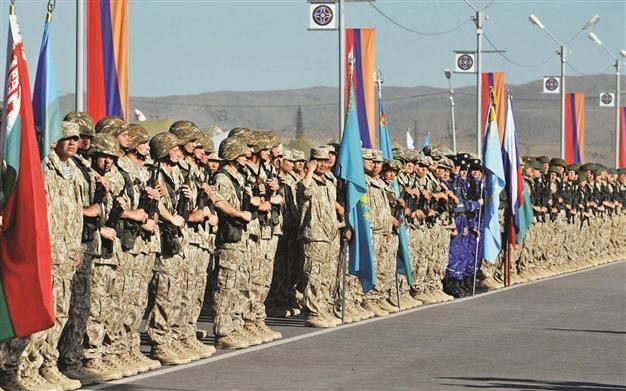Armenia hosts drill as tension continues
YEREVAN

AFP photo
The Russia-led Collective Security Treaty Organization (CSTO) has launched large-scale military exercises in Armenia amid tension with Azerbaijan over Baku’s pardoning of an extradited Azerbaijani soldier who had hacked an Armenian to death.Around 2,000 troops from Armenia, Russia, Belarus, Kazakhstan, Kyrgyzstan and Tajikistan are conducting five days of war games between Sept. 15 and 19.
But the exercises are occurring amid tension between Yerevan and Baku over the latter’s pardoning and promotion of Ramil Safarov, as well as Azerbaijan’s rapprochement with Europe following NATO chief Anders Fogh Rasmussen’s recent praise of the country and President İlham Aliyev’s trip to France tomorrow.
“The military exercises are unprecedented in the history of the Armenian armed forces,” Armenian Defense Minister Seyran Ohanian said at the launch of the Interaction-2012 sessions. The aim was to create “a regional force that can neutralize potential threats, he said.
The scenario of the maneuvers stipulates the rapid deployment of a force repelling enemy attacks in the mountains. Aircraft and artillery units will also participate, including jet volley fire systems. Other planned exercises include an airdrop of troops and a would-be operation to destroy a gang of militants hiding in a mountain village.
The six-nation CSTO is an intergovernmental military alliance formed in 1992 and comprised of Armenia, Russia, Belarus, Kazakhstan, Tajikistan and Kyrgyzstan.
Safarov, who had been incarcerated since 2004 in Hungary, where he murdered an Armenian counterpart at a NATO event, was treated as a hero upon his return and made a major. Yerevan reacted furiously to the pardon and strongly condemned Baku, with Armenian President Serzh Sargsyan saying “making a hero out of a criminal is unacceptable” and accusing Azerbaijan of endangering the region’s fragile peace.
The exercise also comes amid growing closeness between Azerbaijan and Europe. In a recent visit to Azerbaijan, Rasmussen praised oil-rich Azerbaijan for its closer security cooperation with the alliance.
“Our ties are developing steadily and positively,” Rasmussen said after talks with Aliyev on Sept. 7.
The secretary-general said Azerbaijan was a “valuable partner for NATO,” adding that both sides had “an opportunity to build a solid, long-term partnership.” Rasmussen thanked Azerbaijan for its participation in the NATO-led mission in Afghanistan and conveyed the alliance’s appreciation for the country’s additional support given to NATO operations via fly-over rights and transit lines.
Aliyev is heading to France tomorrow. The Nagorno-Karabakh issue will be the main topic of the scheduled meeting with French President François Hollande, according to media reports.
Ankara and Baku also agreed in June to build the $7 billion Trans-Anatolian natural gas pipeline (TANAP) to carry Azerbaijani gas to European markets in what has been perceived as a crucial deal. The project might help Europe diversify its energy supplies by bypassing Moscow, its largest gas provider.
Armenia and Azerbaijan are locked in a long-running conflict over the disputed region of Nagorno-Karabakh, where they fought a war in the 1990s. Negotiators from Russia, the United States and France have led efforts under the auspices of the Organization for Security and Cooperation in Europe (OSCE) since then to find a resolution to the conflict, but with few tangible results.
















